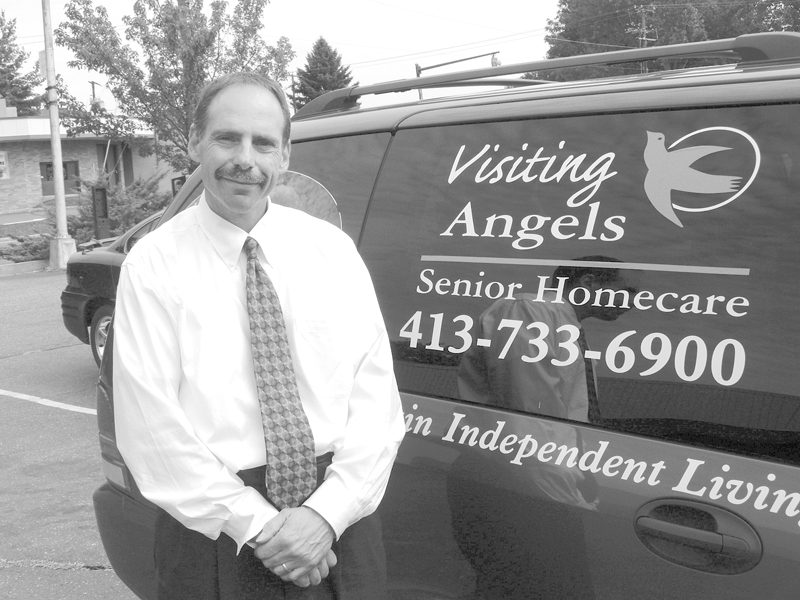
A Matter of Trust
Visiting Angels Franchise Stresses Delivery of Compassionate Care

Joe Arduino says he wants his employees to treat clients as they would treat their own family members.
“He was a hospice patient, and we had an aide from a local hospice agency taking care of my father,” Arduino said. “I was taken back and amazed at the compassion of this home health aide, how she treated my father and our family like it was her own family.”
He didn’t realize then that he would someday make a career of helping other families find similar comfort and help during difficult times. But in 1999, Arduino — at the time a copier salesman who had an itch for entrepreneurship — was on a plane when he stumbled upon a magazine ad for a fledgling chain of home-care services called Visiting Angels. He didn’t even wait until he got home to call the number in the ad, and later that year, he was in charge of the company’s ninth franchise.
“Here it is, 11 years later, and we’ve seen substantial growth,” he told BusinessWest.
Indeed, his franchise, which now employs just under 90 staffers and caregivers, has served more than 1,100 clients in the past 11 years. “We provide services to adults in any age range. Many are 65 years and up, but we have many younger clients as well, adults with disabilities or in need of assistance during a period of recovery from illness or injury.”
Still, he noted that the elderly demographic — particularly those 85 and up — is growing quickly, and many Baby Boomers entering their retirement years have long been independent in spirit, and don’t want to give that up, especially if their daily needs don’t yet require assisted living or skilled nursing care. That’s where home care has a real opportunity to explode in growth.
“Mostly, it’s our clients’ desire to remain in their home environment, and our job is to help them accomplish that goal of independence with dignity and safety, and to try to improve their quality of life, through good caregiver matching and a good, positive relationship with the caregiver.”
The success of the Visiting Angels chain reflects that outlook. It had surpassed 100 franchises just three years after Arduino came on board, and now boasts nearly 400 locations across the U.S., Canada, and countries as far-flung as Brazil and South Korea.
“When we first started in this business, it was a risk because the company was so new,” he said, noting that he and his wife, Michelle, “bet the farm” on Visiting Angels, taking out a second mortgage and cashing in their retirement funds to get started. But it has turned out to be a winning bet; after launching their venture in Worthington and later moving it to Westfield, they opened a second branch in Springfield in late 2006.
“The day we opened [in Springfield], gas prices shot up to $4 a gallon, ‘recession’ was plastered all over the evening news, and our sales had fallen off,” said Arduino. “But since that time, we’ve experienced steady growth in the Springfield office, and this year, our sales are up 24%.
That success has come despite the fact that the economy continues to struggle and joblessness remains high. And that’s due partly to the fact that home care is simply a growing need that families increasingly can’t live without.
For this issue, BusinessWest takes a look at why Arduino is optimistic about the future of his business, and why he’s committed to showing clients the kind of compassion once shown to his own father.
Caring Touch
Although Visiting Angels typically serves clients with chronic health problems or experiencing an acute health crisis, it is not licensed to provide medical care. But such individuals often need help handling other daily tasks.
“We provide personal care such as bathing, assistance with dressing, hygiene and toileting, meal preparation, medication reminders, routing housekeeping, companionship, and transportation to appointments,” he said. “Our care recipients are able to choose their own caregiver, and we remain available for customer inquiries after hours, with a 15-minute response time.”
Michelle Arduino, who had previously been the postmaster of Worthington, is Joe’s business partner, responsible for finances, human resources, and compliance. “She’s very business-savvy,” he said. “She really understands the balance sheet, and she has a keen sense of forecasting financial trends within the company.”
The fact that those trends have been largely positive, despite the economic downturn, is something that Arduino credits partly to the strong relationships Visiting Angels has forged over the past decade with referral sources.
“I can’t thank them enough,” he said. “We work with local rehabilitation facilities and nursing agencies, and have provided supportive home-care services with their patients as they’re discharged home.” Arduino cited other factors in the franchise’s success, from the professionalism of his administrative staff to the reputation the company’s caregivers have developed for compassionate care.
“Our clients, their families, and our referral sources trust Visiting Angels,” he said. “They trust us to send compassionate, honest, and reliable caregivers into their homes. And we take this very seriously. I say to the people in charge of hiring at our company, ask yourself this question: ‘would you send this person to your own parents?’ If they can’t say yes to that, they don’t work for Visiting Angels.”
Determining that level of trust in each individual job applicant starts with the most basic work values. “We look at how they’re dressed. Did they show up on time? Do they return for the second interview on time? We use those things as a guide when making decisions,” Arduino said, noting that, if someone doesn’t treat a potential employer with respect, how can they be trusted to care for a vulnerable person in their home?
Even more important, perhaps, are the criminal and backgrounc checks the company runs, which go beyond the CORI requirements of the Mass. Department of Public Health. “We also provide a national criminal database searcg, a national identity check, a motor-vehiclem search, and a drug test,” he explained. “We’re trendsetters when it comes to employment screening. We really check people out. It’s very difficult to get a job with Visiting Angels as a caregiver.”
That’s because Arduino knows what drew him to this industry in the first place – the remarkable comfort he felt that his father was in good hands. So, he says, he’s built his business around cultivating that same sense of trust with clients.
Life Lessons
Around the time he opened his franchise, Arduino’s mother required home care due to the onset of Alzheimer’s disease, making two parents who used such services, and at different stages in their lives. The potential of this care model was more obvious to him than ever.
“I’m very positive about the future growth of the private-duty home-care industry,” he said, noting that some 79.6 million Baby Boomers have either retired or are preparing to enter the ranks of retirees. “The demand for supportive home-care services will increase dramatically over the next several decades, and consumers as well as health care providers will look to private duty to provide for this population.”
In addition, he told BusinessWest, “I envision further cutbacks in Medicare and Medicaid services and reimbursement rates, which will increase the pressure on health care facilities to just discharge patients at a faster rate. This will put pressure on families to provide care for their loved ones and also contract with private-duty home-care agencies such as Visiting Angels.”
And it all started with his father’s illness, and what he learned about compassionate care.
“At the time, I didn’t realize that this would happen, my decision to start a home-care agency. It’s just something that happens to you in your life,” he said. “Later on, I knew I wanted to start my own company, and I saw an opportunity with Visiting Angels.”
Clearly, betting the farm was a risk worth taking.





